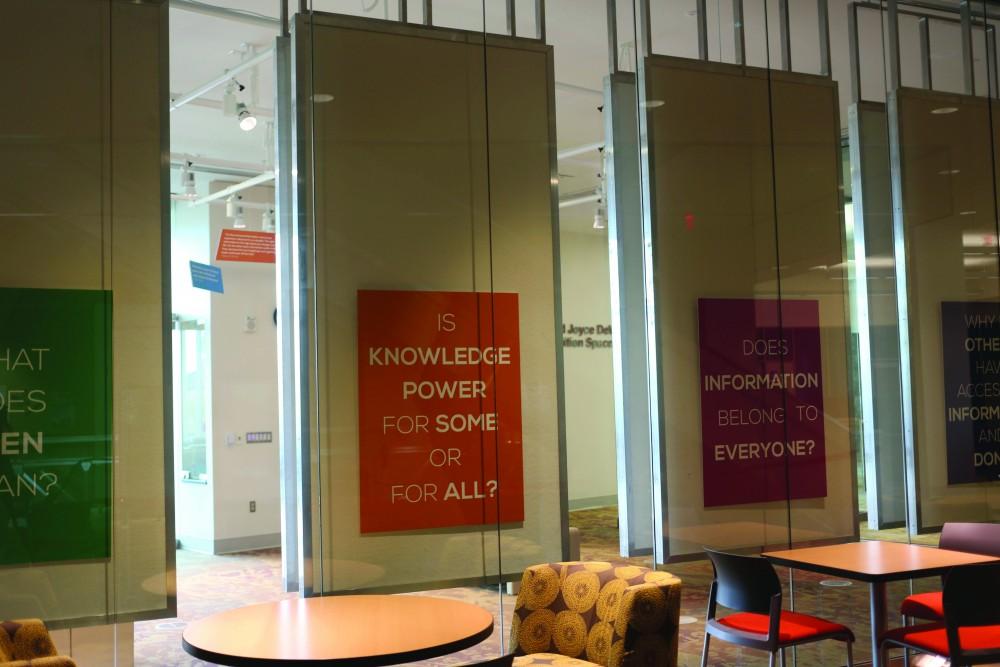MIP Library hosts open access exhibit

GVL/Marissa Dillon The exhibit in Mary Edema Pew Library explores the idea of open access to information.
Aug 23, 2014
What does it mean to open everything? People at Grand Valley State University can find out by visiting the Mary Idema Pew Library’s “Open Everything” exhibit, which is displayed in the exhibition space through Sept. 11.
Sarah Beaubien, head of collections and scholarly communications in the University Libraries, is a supporter of open access. Beaubien said she advised a committee of library staff, faculty members and one student assistant in developing the exhibit for “anyone who needs and uses information.”
“The purpose of the exhibit is to introduce the concept of information as a commodity and to begin a conversation about access to information,” Beaubien said. “Our hope is that the Open Everything exhibit will encourage thought and conversation about some of the economic and social issues surrounding the creation and distribution of scholarly, creative, educational and technical information.”
The exhibit focuses on four main categories: open access, open data, open software and open textbooks. Beaubien said open access is often a complex concept to understand because although it allows anyone to access content, there is still a cost in producing the information.
“Open access publication models are supported in a number of ways including grants, institutional or organizational funding and author fees,” she explained. “No matter how they are supported, all open access resources are available to a worldwide audience.”
Beaubien added that the exhibit is important because scholarly journal subscriptions and textbook prices are increasing every year, making more and more information unaffordable for the Grand Valley community. Open access, she said, can provide the resources to “allow anyone to read, use and adapt content to meet their needs.”
Erin Fisher, library program manager, also supports open access and helped coordinate the Open Everything exhibit. Fisher said she designed the project with a focus on how to make it engaging and interactive to bring people into the exhibit.
“One privilege we have as university members is the access to higher quality information, which isn’t necessarily available to the rest of the world,” Fisher said. “We hope that visitors can better understand the complexity that comes with placing barriers to access information or alleviating those barriers.”
The exhibit uses stories to put open access into a more global perspective, Fisher said. She sees the value in open access because it allows people all over the world to share information that can lead to solutions for common problems. She said free access to information can expedite innovation at a global level.
“We need to understand the injustice that comes with limited access to information,” Fisher said. “This can be difficult to grasp, because of the internet we have so much (information) at our fingertips, so we wanted to create an exhibit that would allow students to begin thinking about the importance of information in our world.”
In addition to faculty and staff, GVSU students are also showing their support for open access through groups such as the Right to Research Coalition.
Scott St. Louis, vice president of educational affairs for Student Senate, said he authored the April 2013 resolution that made Student Senate a member of the Right to Research Coalition, a global organization that works to promote open access through education and advocacy. He works directly with the group’s director and other leaders to “gain access to make sure students know about this issue and to engage others.”
The Open Everything exhibit, St. Louis said, may be small, but it highlights “interesting stories in an approachable way.” He said this is important because we should not have to pay millions of dollars for content that the public is already paying for through taxes and other funds. He gave ScholarWorks@GVSU as an example of open access university research in which the library helps pay the author fees.
In the future, St. Louis said the Student Senate hopes to talk with professors about open textbooks for students who often struggle with rising costs.
To see examples of GVSU-authored works that are open access, visit www.
scholarworks.gvsu.edu.























